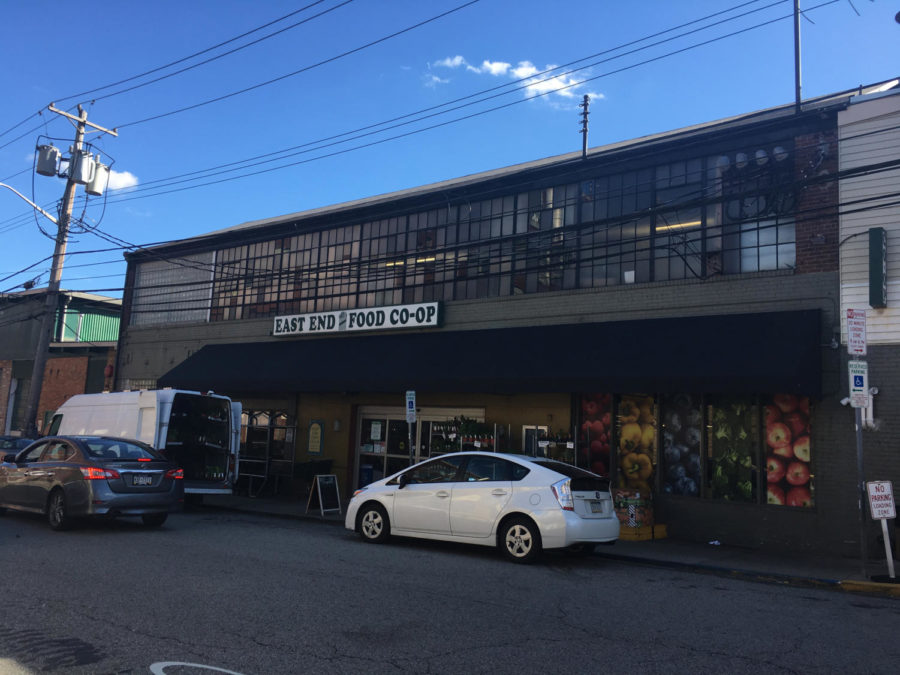East End Co-op: a fresh food fountain in the desert
The East End Food Co-op serves as one of two full-service grocers in the Wilkinsburg borough. (TPN File Photo)
September 27, 2018
In the midst of Wilkinsburg, fresh produce and nutritious groceries are far and few. The predominantly African-American borough has nearly 16,000 residents with a median income of $29,620 and only two grocery stores to serve them.
Kate Safin is the marketing and member services manager at one of these grocery stores, the East End Food Co-op.
“We are one of the only grocery stores in this specific area of the East End, and we do offer a wide variety of the fresh fruits and vegetables and things that are often harder to access in what some would define as a food desert,” Safin said.
Alongside the discount food chain Save-A-Lot, the co-op, located on Meade Street between Wilkinsburg and Point Breeze, has operated as a full-service grocery store since 1978. The operation is run by only 70 employees and works with more than 150 local suppliers to bring food items that not only support shoppers’ health, but also the local economy.
The co-op can trace its roots back to 1972, when Point Breeze locals David and Rodah Zarembka opened a food-buying club in the basement of their home. For the price of $1, community members could join the buying club and purchase fresh produce direct from suppliers at wholesale prices.
Today, the East End Food Co-op has more than 12,000 members, according to its website. Shoppers aren’t required to be members like they were at the store’s conception, but those who are have exclusive-access discounts — such as 2 percent off every purchase, a 10 percent discount on one transaction per yearly quarter, access to the co-op’s credit union and certain discounts on special orders.
[d3-source canvas=”wpd3-135817-0″]
Prices at Giant Eagle are higher than the East-End Co-Op for many grocery items. (Graphic by Brian Gentry | Online Visual Editor)
Providing community access to affordable, natural food items has been part of the co-op’s core mission since it began as a food-buying club, Safin said. For decades, it was difficult for the neighboring community to access certain types of food at decent prices — but the co-op changed that.
“People who were looking for really healthy items or specialty products couldn’t get them, so the concept of the buying club, which is what we are rooted in, was that, ‘I’ll buy a whole case and then we’ll split up that case and then it makes it affordable and accessible for everybody,’” Safin said.
Inside the co-op, a robust bulk section offers an array of packageless products from peanut butter to pasta to kombucha on tap. In the back of the store, a vegetarian cafe, hot food bar and salad bar serve ready-to-eat meals. Aside from food, the store also sells wellness supplements, cosmetics and gift items.
The co-op specializes in organic products, bulk foods and locally sourced produce, meats and cheeses, all at affordable prices. It also has a bi-weekly flyer called Co+Op Deals, which advertises current sale prices on selected items featured throughout the store.
Further increasing affordability, it partners with the National Co+Op Grocers — an organization that works with nearly 150 similarly structured grocers across the United States — to provide its in-house affordability program, Co+Op Basics. This program works to offer low prices every day on more than 400 different food products throughout the store, ranging from canned items to fresh meat.
“We do regular price comparisons just to make sure that we’re maintaining pretty good prices for our consumers. We do the absolute best we can,” Safin said. “We may be higher with some things, we may beat the price on others. It just depends on what’s in your basket.”
Penn Hills resident Jeff Prince believes some of the co-op’s items are pricier than other retailers, but for some things it’s his go-to shop.
“Sometimes I think certain things is overpriced, but it just seems like the co-op is the best place to get certain things,” Prince said. “I guess organic stuff, I just go for honey.”
While most shoppers appreciate the low prices, some also come for food they can’t get anywhere else.
“It’s hard to get alfalfa seeds, so that’s where I go, and I like their extra-extra-firm tofu,” Wilkinsburg local Joyce Hylazewski said. “What I can’t get at another store, I get there.”
The co-op has discount programs set in place for shoppers that may struggle with access to affordable healthy foods. SNAP beneficiaries and seniors are given special discounts as a courtesy. Any purchase made with an ACCESS card is given a 10 percent discount, even if any of the items purchased aren’t covered by the SNAP program. On Tuesdays and Thursdays, seniors are given 5 percent off their total purchase.
“We hope that offering this discount will make healthy foods more affordable and accessible to everyone in our community,” the co-op wrote on its website.
Along with affordability, Safin said sustainability is another important value of the co-op. The store donates 8,000 pounds of food each year to 412 Food Rescue, a Pittsburgh-based nonprofit that works with food retailers to connect surplus food with food-insecure communities. The organization takes rescued food and delivers it to partner organizations that provide support to individuals in the Pittsburgh area.
The co-op works to make an impact in its surrounding communities through giving programs and donations, Safin said, while also bringing the best natural foods and most affordable prices to its shoppers.
“We’re offering the best- and highest-quality food, as locally sourced as possible, to consumers. I think that’s something that not every grocery store is doing. Some grocery stores definitely try to do that, but they’re not doing that on the scale of a co-op,” Safin said.



